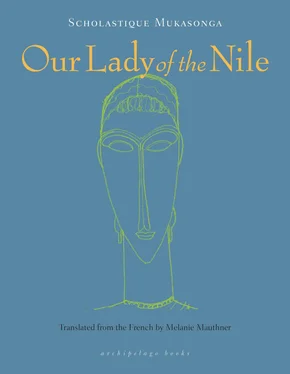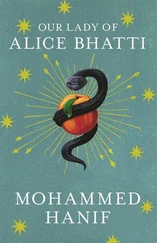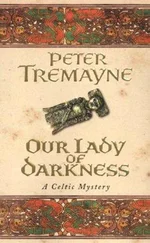Mother Superior and Father Herménégilde appeared suddenly from behind the altar, bowed before the tabernacle and turned to face the pupils. They stood in silence for a while. Father Herménégilde’s paternal smile fell on each new face — they’d seated the newcomers in the front row.
Finally, Mother Superior spoke. She welcomed all the pupils, especially those attending the lycée for the first time. She reminded everyone that the lycée of Our Lady of the Nile was founded to train the country’s female elite, that those fortunate enough to be there, seated before her, had a duty to become role models for all Rwandan women: not simply to be good wives and mothers, but also good citizens and good Christians — the one not being possible without the other. Women also had a great role to play in the emancipation of the Rwandan people, and it was the girls of the lycée of Our Lady of the Nile who had been chosen to spearhead women’s advancement. But she firmly reminded the lycée girls that in the meantime, before they became drivers of change, they must obey the lycée’s rules to the letter, with the slightest infringement being severely punished. She also made one thing clear: the only language permitted within the grounds of the lycée was French, except in Kinyarwanda classes of course, but only in class, and nowhere else. Once they married men in positions of high office (and why shouldn’t some of the girls end up holding such positions too?), they would be required to use French as their main language. And above all, it was forbidden to utter a single word of Swahili in the lycée, which had been placed under the patronage of the Virgin Mary, for it was a deplorable language, that of the followers of Muhammad. She then wished all the girls a good and studious year, and called on Our Lady of the Nile to bless them.
Father Herménégilde made a long and rambling speech, in which he posited that the people of the hoe who had cleared the huge and hitherto impenetrable forests that covered Rwanda had finally freed themselves from nine hundred years of Hamitic domination. As a humble priest of the indigenous clergy, he himself had contributed, albeit modestly (though he was prepared to share this confidence with them that evening), to the social revolution that had abolished serfdom and drudgery. He may not have been a signatory to the 1957 Bahutu Manifesto, but he had been one of its principal instigators (although he didn’t wish to boast): the ideas and demands laid out within it were his. And so he called upon his audience of beautiful young women, so full of promise, who would one day grow into great ladies, to always remember the race they belonged to, the majority race, the sole native one that …
Mother Superior, who was rather frightened by this outpouring of eloquence, cut off the orator with a single look.
“And. And now,” stammered Father Herménégilde, “I will bless you, and may you receive the protection of Our Lady of the Nile, she who watches over us from so close to our lycée, at the birthplace of that great river.”
The first week of the school year nearly always coincided with the start of the rainy season. If the rains were late, Father Herménégilde would ask the pupils to go and offer a bouquet to Our Lady of the Nile, on Sunday after Mass. They’d pick flowers under the anxious, watchful eye of Sister Bursar, who fretted that the girls would destroy her garden, then off they went to lay the wreath at the statue’s feet, next to the spring that never ran dry. Most of the time, there was no need for this pilgrimage. A blast of ceaseless thunder rolling and grumbling from the valley meant the rains were on their way. A dark sky, darker than the bottom of an old stockpot, poured down torrents of rain as the children of Nyaminombe celebrated, dancing and squealing with joy.
For the seniors, lycée life held no further mysteries. They no longer jumped at the noises that woke them each morning: the groan of the gates being opened, the clanging of the school bell, and the whistles the monitors blew as they walked through the dormitories prodding the girls who were slow to rise. Godelive was always the last to get up, whining about wanting to leave the lycée, how she wasn’t cut out for studying. Modesta and Immaculée did their best to encourage her, reminding her that Christmas break was approaching, that it was her last year; finally, they would end up yanking her forcibly out of bed. Quickly, they had to take off their nighties, wrap themselves in one of the two large towels that Sister Bursar had given out at the start of the year, tie it under one armpit, then run to the washroom, jostling to reach one of the faucets (showers were taken in the evening). Thanks to her sturdy build, Gloriosa was always the first to lean over the rushing water: everyone else had to make way for her, no matter what. Ablutions over, there was barely enough time to slip into the blue uniform and head to the refectory for tea and porridge. Virginia would swallow it with her eyes shut, forcing herself to think of the delicious ikivuguto buttermilk her mother prepared for her each morning during vacation.
She pushed away the little cup filled with powdered sugar, which the other girls fought over so viciously, despite some of them having their own supply, which they poured into their cups to make a sugary gruel. Sugar, a rare commodity in the hills, tasted horribly bitter to Virginia. When she entered sixth grade, she’d never seen as much sugar as she saw here in the cups placed on each of the breakfast tables. She thought of her younger sisters. If only she could bring them the contents of that little cup! Virginia could already imagine the outline of their lips, all white with sugar. She decided to discreetly purloin a few pinches of the precious powder that filled the little cup. It wasn’t easy, because this coveted treat was very closely watched. What’s more, being Tutsi, Virginia received the cup last, and there were only a few grains of sugar remaining at the bottom. She carefully scooped them up with her teaspoon, and instead of pouring the sugar into her bowl, slipped it furtively into one of the pockets of her uniform as quickly as possible. She emptied her pocket every night, and by the end of term she’d managed to fill half an envelope. But Dorothée, who sat next to her, saw what she was up to, and just before breaking for vacation, she said:
“You’re a thief. I’m going to tell on you.”
“Me, a thief?”
“Yes, you steal sugar every morning. You think I don’t notice. You want to sell it back home in the countryside, at the market, during vacation.”
“It’s for my little sisters. There’s no sugar in the countryside. Don’t tell on me.”
“Perhaps we can make a deal. You’re top of the class in French. If you write my next essay, I won’t say a thing.”
“Let me take the sugar for my little sisters.”
“If you write my essays for the rest of the year.”
“I’ll do it, I swear, for the rest of the year.”
The teacher was amazed at Dorothée’s sudden progress. He suspected some kind of cheating was going on but didn’t care to find out more. From then on, Dorothée’s grades in French were the best in the class.
The bell clanged again. Lessons were about to start: French, Math, Religion, Health and Hygiene, History, Geography, Physics, Physical Education, English, Kinyarwanda, Sewing, French, Cooking, History, Geography, Physics, Health and Hygiene, Math, Religion, Cooking, English, Sewing, French, Religion, Physical Education, French …
The days wore on.
There were only two Rwandans on the entire teaching staff of the lycée of Our Lady of the Nile: Sister Lydwine, and the Kinyarwanda teacher, naturally. Sister Lydwine taught History and Geography, but she made a clear distinction between the two subjects: History meant Europe, and Geography, Africa. Sister Lydwine was passionate about the Middle Ages. Her classes were all about castles, keeps, arrow slits, machicolations, drawbridges, and bartizans. Knights set off on crusades, with the Pope’s blessing, to liberate Jerusalem and massacre the Saracens, while others fought duels with lances for the eyes of ladies wearing pointy hats. Sister Lydwine talked of Robin Hood, Ivanhoe, and Richard the Lionheart. “I’ve seen them in movies!” said Veronica, unable to contain herself.
Читать дальше












